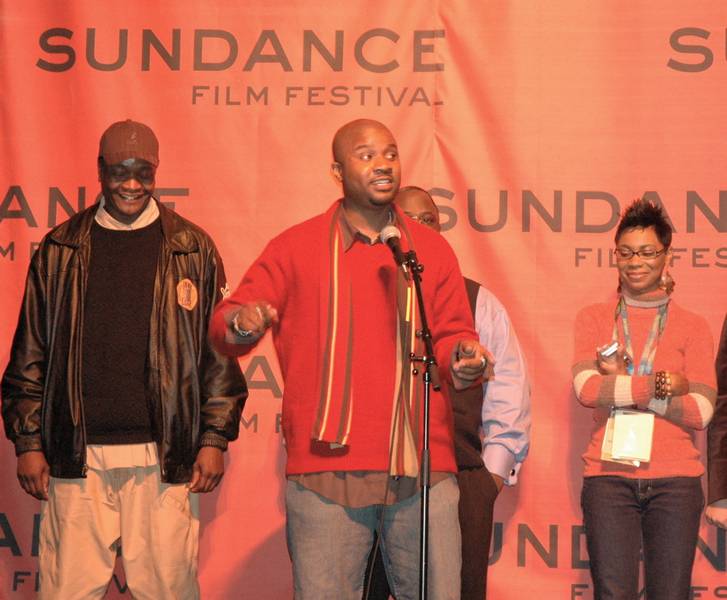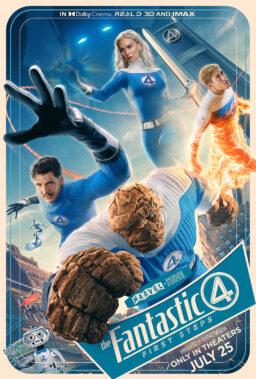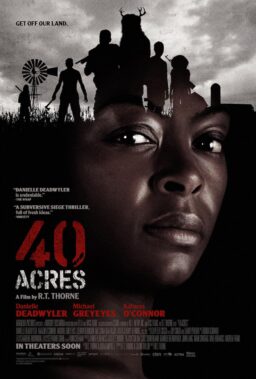PARK CITY, Utah – John Cooper, who has been programming films at Sundance for almost 20 years, had a particular tone in his voice as he introduced “Somebodies” Friday afternoon. This wasn’t a routine introduction. “Certain moments at Sundance we remember,” he said, “because they were the beginning of something great.”
You would expect that “Somebodies” would then unreel as a profound social statement or bold visual breakthrough. But no. This new film by a director from Georgia named Hadjii is great in a different way, for how it breaks through the conventions that wall in films about African-Americans. It is not uplifting or angry or about drugs or crime or sports or music or sex. It is about ordinary young people who are very, very funny because they don’t seem to know they’re in a movie, and aren’t performing for any imagined audience, black or white. Their purpose is to celebrate themselves.
“Black films are under so much pressure to provide ‘role models’,” Hadjii said in a Q&A after the screening. “These characters are not good or bad. They’re going through a transitional period.” They’re living, in other words.
Hadjii stars, as Scottie, a college student who drinks too much and sleeps through church services and meets a girl (Kaira Whitehead) who likes him but isn’t going to sleep with him until he has his “paperwork.” At a clinic where she takes him to get tested for AIDS, she suggests the “player’s special,” a package price for all the popular STDs.
Scottie’s friends, concerned about his drinking, decide to stage an intervention. But he’s late getting home, and they start to drink and play cards, and when he arrives they decide to put off the intervention while they go out and get something to eat. There are several church services in the movie, one featuring a black preacher whose holy rants are punctuated by the sober, factual footnotes and responses of the deacon who stands beside them. Their rhythm in these sermons achieves a kind of comic verbal ecstasy. No less funny is the all-white Campus Christian Coalition meeting Scottie attends. These scenes don’t make fun of church or religion; they are funny, but fond.
So is the whole movie. It’s more a matter of tone than plot, of letting characters (including uncles, aunts, friends, visitors) run loose in verbal riffs of astonishing invention and remarkable sexual speculation. If along the way Scottie is somewhat redeemed, that happens in the margins; the movie is not about the salvation of Scottie, but about the process by which he gradually moves in a better direction.
Like all really good films, “Somebodies” defies description, because it’s not about plot, it’s about how it celebrates its characters. It started life as a screenplay when Hadjii was a student at the University of Georgia; his professor, Nate Kohn and his wife Pamela Kohn admired it and decided to produce it. Local money supplied the small indie budget. What you feel, watching the film, is that moments of truth are being set free; that unlike many films about African-Americans, this one isn’t made with the slightest concern for the “impression” it might make; it is being generated by the joy of the characters.
“Somebodies” was the third of four films I saw at Sundance on Friday — all comedies. The funniest laugh-out-loud audience pleaser was “Little Miss Sunshine,” a first film by Jonathan Dayton and Valerie Faris, written by Michael Arndt, which begins with a family that seems destined to explode.
The father (Greg Kinnear) is obsessed with positive thinking, and hopes to get rich with a self-improvement scheme. His wife (Toni Collette) is a center of sanity. Her brother (Steve Carell) has come to live with them after attempting suicide. Her son (Paul Dana) is training for the Air Force and living under a vow of silence. Her daughter (Abigail Breslin) is a finalist in the Little Miss Sunshine Contest. And her father-in-law (Alan Arkin) has been thrown out of the retirement home for loudly and obscenely advocating 1960s values while sniffing heroin.
The plot, never mind why, lands them all in an ancient VW bus that has to be pushed to 20 mph before it will turn over. The whole family, never mind why, has to pile in the bus and drive to the Little Miss Sunshine contest in Redondo Beach. This contest, with its little girls made up to look like hookers, is blown to pieces by the astonishing performance of the little girl, who thanks her grandfather for “teaching me the moves.”
As we moviegoers huddled afterwards in the cold, waiting for the shuttle bus, a buyer told her friend, “That movie is going to sell for a lot of money.”
Nicole Holofcener’s “Friends with Money” is about four friends, three rich, one (Jennifer Aniston) working as a maid. The others are Frances McDormand, Catherine Keener and Joan Cusack, and all of their marriages are going through varieties of crisis, in a series of scenes built on satirical psychological excavations. I didn’t like it as much as “Lovely and Amazing,” but then how could I. It has the moves and the moments, but not as much heart.
“Kinky Boots,” by Julian Jerrold, is like a throwback to the British comedies of the 1950s, although in 1957 it might not have starred the strapping actor Chiwetel Ejiofor as a drag queen. Joel Edgerton, who looks uncannily like a young Albert Finney, plays the heir to a failing shoe factory in Nottingham. He meets the drag queen by accident, and has a brainstorm: The factory can be saved by converting from men’s dress shoes to men’s kinky boots, built to hold the greater weight of a male drag queen during the wear and tear of a drag show. Well, why not? The movie is conventional, even old- fashioned, in its structure, but Ejiofor, as “Lola,” transforms the material with what can only be described as a muscular performance.
It was somehow inevitable that “Kinky Boots” was “based on a true story.”
Note: Nate Kohn, producer of “Somebodies,” is the director of my Overlooked Film Festival.












